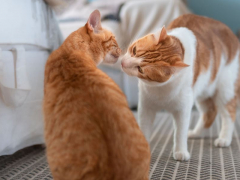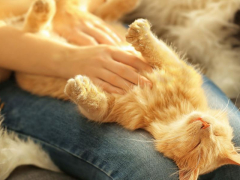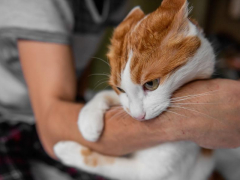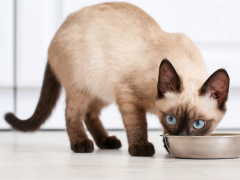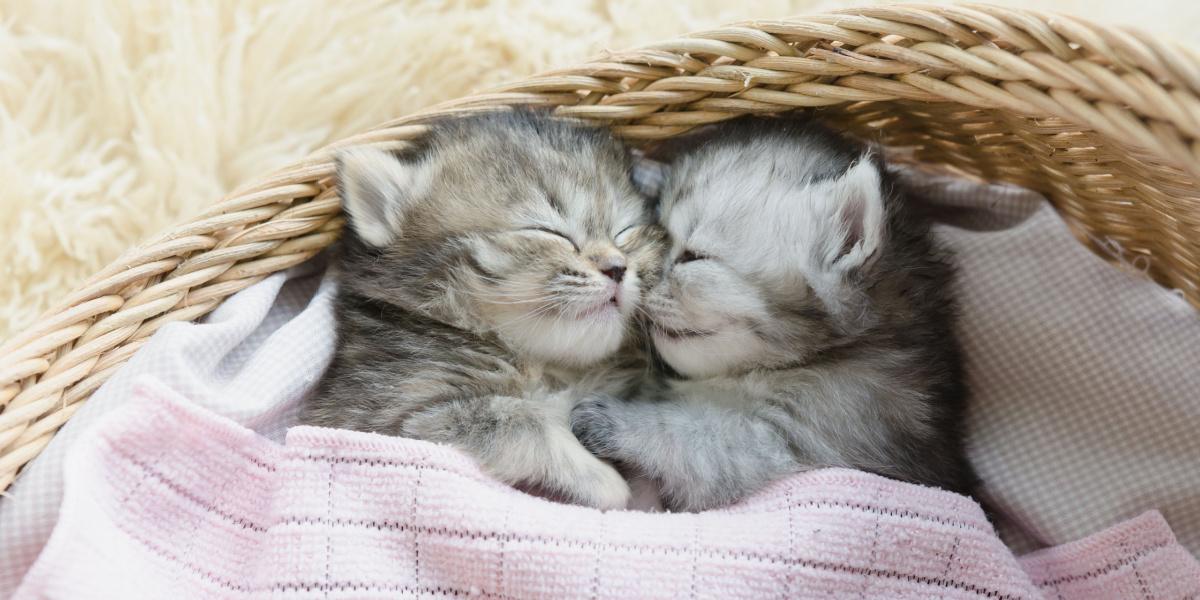
Most cat owners are well aware of their pets’ extraordinary ability to get some shut-eye in any place, position, or time. Cats seem to spend much of their day dozing—in a comfy lap, curled up in their bed, or perhaps on a sunny windowsill. The phrase “catnap” wasn’t invented for nothing!
Cats sleep for around 16 to 18 hours a day, but kittens sleep even more than this, up to around 22 hours in a 24-hour period. This sleeping time might seem excessive, but is essential for vital growth and development, and to fuel their active lifestyle.
Let’s have a look at why sleep is needed, some kitten sleeping habits, and how to encourage a healthy sleep schedule, either for a newborn kitten or adult cat.
Why Do Kittens Need Sleep
Sleep is an essential function of life. It allows your kitten’s mind and body to recharge. Without sleep, brain function is depleted, and lack of sleep can also affect the immune system, making kittens more prone to disease.
Kittenhood is a period of rapid growth and development, which requires a lot of energy. Cat food provides calorific energy, but sleep is needed for these developmental changes, especially the growth of the brain and nervous system. Snoozing for long periods also rests the body so that kittens are ready for their intense bursts of activity when awake, from playtime to pouncing and chasing, and even mealtimes.
Cat Sleep Patterns
Sleep cycles and amount of sleep needed are usually controlled by daylight levels, which affect the production of the hormone melatonin. This is called a circadian rhythm and alters between species and between individuals.
Our domestic pet cats are descended from wild cats that lived in the deserts and plains of North Africa and hunted small prey for their survival. They have therefore evolved to be crepuscular: active at dawn and dusk when small birds and mammals are most easily found. These sleeping habits have persisted. Cats often sleep in short bursts, and might even be wide awake in the middle of the night.
Wild cats were prey species as well as predators, and cats can rouse very easily from even a deep sleep. They can be found snoozing with one eye open, still alert despite their relaxed pose. Periods of deeper sleep are still necessary, and cats might choose to mitigate the risk of their vulnerability whilst sleeping by choosing to curl up with a trusted companion or sleep up high in a secure bed with a good vantage point.
How Many Hours of Sleep Do Kittens Need?
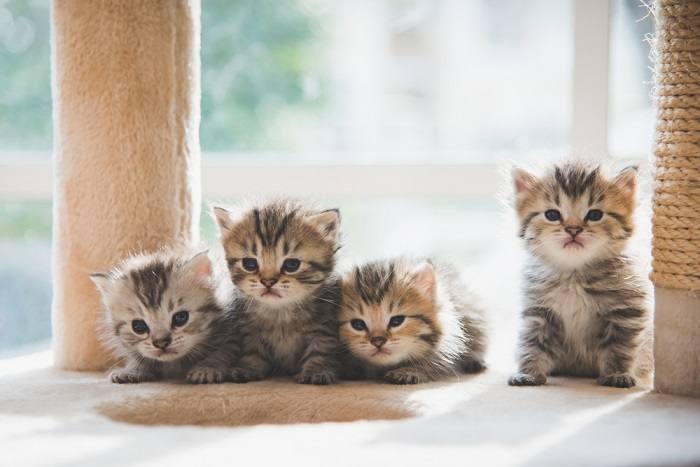
By 2 months of age, kittens sleep an average of 18 hours a day.
Adult cats sleep for an average of 18 hours a day (with variation between 16 to 20 hours) and kittens can sleep for up to 22 hours daily.
In their first couple of weeks of life, a newborn kitten might sleep more than 20 hours per day. This is a period of extremely rapid growth and adjustment to life. Their sleep is mostly “rapid sleep” or REM (rapid eye movement) sleep, with some small twitching movements of the face and eyes being perfectly normal. Very young kittens are unable to regulate their own body temperature and will sleep cuddled up to their mother and siblings.
From 2 to 3 weeks of age, kittens start adding in periods of deeper sleep and will sleep for slightly less time over the course of the day, although still around 19 to 20 hours. They begin to be able to sleep alone and will be more active in their awake periods, exploring their new home environment.
By around 2 months of age, kittens sleep for around 18 hours a day, often alone. They will pick a warm, comfortable and secure place, such as a raised cat bed in a sunny spot. They will have a lot of energy in between sleep bouts and will show interest in cat toys, as well as interacting with their siblings or any other playmates.
Their sleep is split into cycles, with around five minutes of REM sleep followed by 20 to 25 minutes of deeper rest. An older kitten needs sleep to be prioritized still—even though they are no longer newborn, they are still developing rapidly.
Encouraging Good Sleep Habits
If you are bringing home a new cat, whether an adult or a kitten, encouraging a healthy sleep schedule is important. Sleep is necessary for health, and neither you nor your pet will benefit from broken nights. Here are some top tips:
Have a Routine
Cats are creatures of habit, and if you keep their routine stable, consistent sleep should follow. Mealtimes, cleaning the litter box, and play sessions should all be regular and predictable.
Active Play
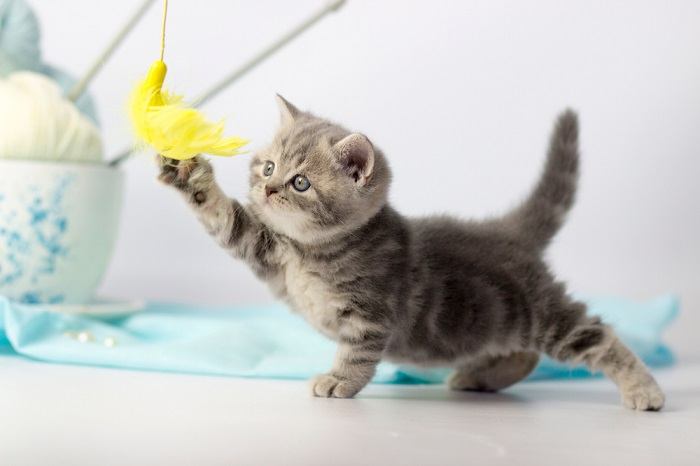
If you want your kitten to sleep more at night, make sure they get enough exercise and play during the day.
Kittens especially have a lot of energy, and the more activity and playtime they have, the more rest they will need to recover. Keep daytimes active and fun to help your kitten sleep in longer sessions overnight.
However, both cats and kittens should be allowed to rest during the day, as their sleep requirements are high compared to a human’s. Don’t disturb them if resting, but make their natural awake times full of fun and games.
A Late Dinner
Feed your kitten food just before bed, as a full tummy will help them settle for longer. Kittens need regular feeding, so have cat food available at all times, if possible, to avoid a small furry creature giving a loud meow in your face to ask for food in the early hours!
Provide a Perfect Bed
Cats can be fussy about where they sleep! My cat chose to ignore the carefully selected, expensive cat bed in favor of a pile of shoes (yes, really!), so don’t be disheartened if your kitten makes an equally baffling choice.
However, an ideal cat bed should have high sides for protection, a warm blanket for extra coziness, be in a warm place, and be placed somewhere up high. A comfy bed in the perfect position might encourage better sleep!
When to Worry: Too Much or Too Little Sleep?
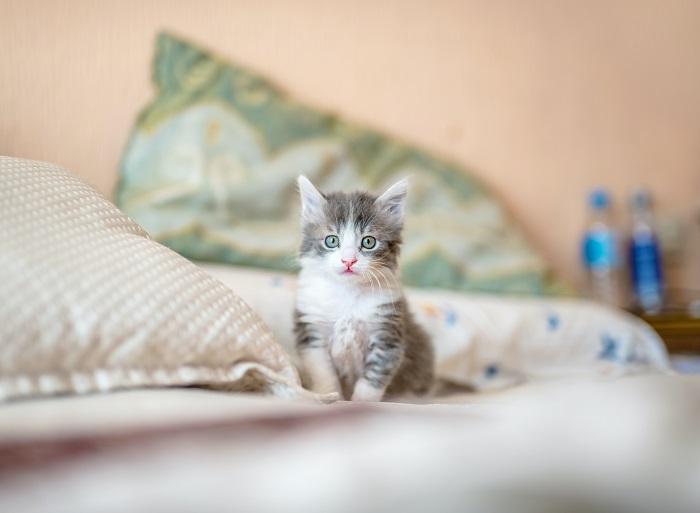
Sleeping too much or too little is sometimes a sign of a health issue.
Being a pet owner is a big responsibility, and it can come with a lot of worries attached! If you think your cat might be sleeping too much, or too little, then a checkup with a veterinarian would be recommended.
Cats naturally sleep for quite large portions of the day, so judging sleep amounts can be difficult. Keeping track of your cat’s usual sleeping preferences can be helpful to decide if their amount of shut-eye has altered. Changes in sleep can also be a sign of stress or anxiety in cats.
Too much sleep or an increased general lethargy can be a sign of illness in cats. Felines species are very good at masking pain and signs of disease, so subtle signs such as sleeping more can be the only symptom that something is wrong.
A reduction in sleep can also be problematic. Kittens might not get enough sleep if their environment is too stimulating, and this can cause issues with their development, so make sure they are given enough time to rest and recover. Some illnesses, such as hyperthyroidism and feline cognitive dysfunction can lead to changes to your cat’s usual sleep-wake cycle, including increased night waking.
If you’re concerned about your kitten or cat’s sleep habits, health or behavior, seek veterinary advice.
Sleep in Kittens: Final Thoughts
Cats sleep a lot—really, a lot! Adult cats sleep around 18 hours per day, but kittens can top that at around 20 hours daily. Sleep is hugely important for kittens, as they are growing and developing rapidly, and sleep helps to support many functions.
Cats are active mostly at dawn and dusk and will sleep for short periods throughout the day. Good sleep habits can be encouraged by providing an optimal bed, a good routine, and plenty of active play in the light hours.
Also Read: Do Mother Cats Discipline Their Kittens? A Veterinarian Explains
